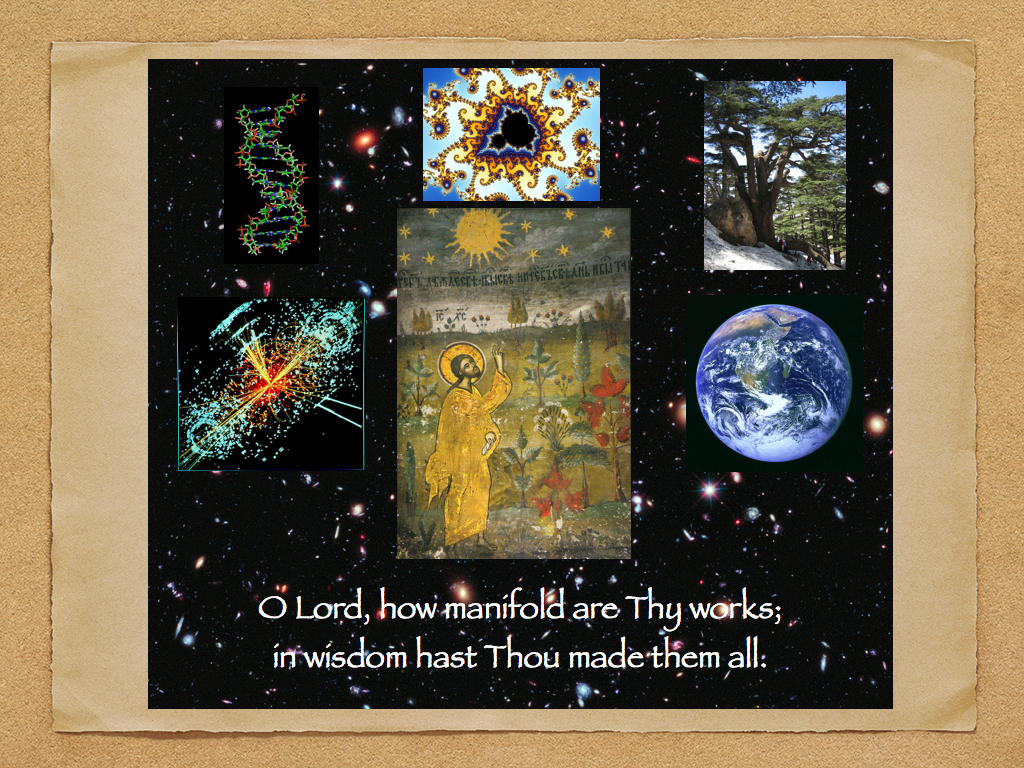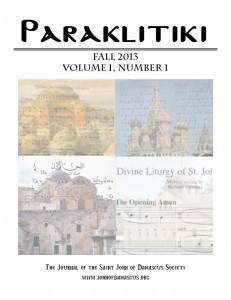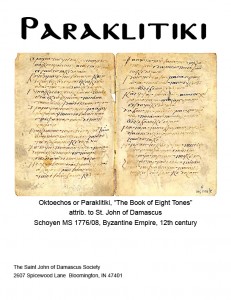“With wisdom you have made them all”
 So, we’ve launched a Kickstarter project (LINK).
So, we’ve launched a Kickstarter project (LINK).
Hal Sabbagh, the president of our Executive Board, is an electrical engineer with a PhD. He’s a scientist by any definition of the word; he’s also, I can tell you, a very faithful man. He, along with our vice-president Vicki Pappas, had a big hand in starting the parish here in Bloomington and building it into what it is now, and he is one of the cantors from whom I’ve learned a great deal about what it means to pray while you sing. For Hal, there is no inherent conflict in being a scientist of faith; “When I’m working out an equation,” he’s told me before, “I’m talking to God in His own language.”
About nine months ago, Hal was very excited about CERN’s discovery of the Higgs boson, the “God particle”. We were having one of those conversations that was about everything all at once, including things like what he wanted inscribed on his casket (which I won’t say, specifically, but it’s very much in keeping with the kind of man he is; I just told him, “Hal, as far as I’m concerned, you’re going to live forever, but I’ll make sure that it happens”), when he brought up the Higgs report. “You see,” he said, very intently, “I think Orthodoxy has something to say about this through our liturgical music. What would be the hymn that could be relevant to this kind of thing?”
I thought about it, and what I came up with was the Vesperal psalm, Psalm 103 (104), with all of its language of God’s glory being revealed in Creation, like in these first few lines:
Bless the Lord, my soul! O Lord my God, you have been greatly magnified. You have clothed yourself with thanksgiving and majesty, wrapping yourself in light as in a cloak, stretching out the heavens like a curtain, roofing his upper chambers with waters, placing clouds as his mount, walking on the wings of the wind, making spirits his Angels and a flame of fire his Ministers, establishing the earth on its sure base; it will not be moved to age on age.
Granted, Psalm 103 is not always sung everywhere, but it can be, with Fr. Sergei Glagolev’s setting certainly being an old favorite for a lot of people (and rightfully so!). At the time, I had also been listening a lot to the Cappella Romana disc Mt. Sinai: Frontier of Byzantium, which starts off with a haunting reconstruction of how Psalm 103 would have been sung in Palestinian practice, followed by the current Byzantine practice of singing the Anoixantaria, the verses starting with “When you open your hand all things will be filled with goodness…”, in a slow, melismatic texture.
I mentioned some of the verses from the psalm, and Hal got very excited. “Yes,” he said, “that’s exactly what we’re looking for. Could we commission a setting of it? And if we did, how could we use it as a way to talk about science and faith?”
Well, sure, we could, I said… but as I thought about it more, I realized that if we were interested in using such a piece to reach a wider audience on a theme of contemporary significance, there was something that we could do that might be more intriguing.
As Hal and I talked, and as the rest of the Executive Board got in on the conversation, the vision that emerged had progressed far beyond simply commissioning a setting of Psalm 103. Rather, what we said we wanted to do was to get a group of currently-active composers in various idioms of Orthodox liturgical music to collaborate on a long-form setting, with each being responsible for a section of text that will be set in their own idiom. Then, to get a high-quality recording made of it. Then — and this is the part I’m personally really excited about — commission a short film to accompany the recording, with the concept being that this great Psalm of Creation will accompany a montage of images of Creation, from the Higgs boson to the great galactic clusters, and everything in between.
We made contact with our composers, a wide-ranging company of different styles, training, and experience. They were intrigued by the challenge of employing different traditional compositional styles in a collaborative and creative effort.
How do we get started then? the board asked, and we agreed that we needed to tackle this in stages, and if we played our cards right, each stage would feed into the next one. So, stage one, we need to commission the composition itself, and get it published. Once we have that, we can use that product as a stepping stone into getting it recorded by a professional vocal ensemble who will be able to handle the different musical idioms that will be represented. The final stage will then be to commission the film.
Kickstarter seems like a practical way for an organization like ours to raise the funds for what is, ultimately, the fairly modest initial expense of commissioning and publishing the work. Cappella Romana had great success with their Kickstarter project for the Live in Greece album, and Rob Thomas was able to raise more than our entire goal in the last 45 minutes of the Veronica Mars campaign, with an average pledge of something like $62. With 374 “likes” on our Facebook page, I think this is very doable with your help, and I’m excited by what we’ll be able to do on the other side of it. Showing we can do this part is what, ultimately, will make the other parts possible.
Our mission statement is “revealing Orthodox Christianity through its sacred music”. To put it another way, we believe that the sung tradition of the Orthodox Church is one of its greatest treasures, and that in and of itself it can be a powerful tool for outreach and education. The Psalm 103 project is absolutely in line with such objectives; if done right (which I have every faith our composers will be able to do, as well as those involved with subsequent stages), I think it will have something powerful to say about our universe and about the Orthodox Christian faith that we hold. In addition to whatever financial support you may be inclined to give, please pray for the Saint John of Damascus Society as we undertake this effort!
I would be remiss if I did not say something about yesterday’s events in Boston. Memory eternal to those who were lost, and our prayers are with everybody who was there. Lord have mercy! We live in times that seem senseless. We are scared of so many things — scared of going out in the street, scared of war, scared of the economy collapsing, of losing our way of life. Besides being scared, people are angry — our own city streets, and perhaps our very country, no longer feel safe. Especially in the current climate, with it looking like the sky is literally falling around us some days, it is the task of all Christians to pray for the world, and I believe it is the task for artists — most certainly including composers — to find ways of shining light in the darkness. Therefore, it should be particularly the concern of the Christian artist to find creative ways of expressing that prayer for the world through the arts of the Church, and thus doing so in a way that shines Light in the darkness. That said, I urge you to please support International Orthodox Christian Charities’ Emergency Response efforts in Boston (LINK); every little bit will help.

